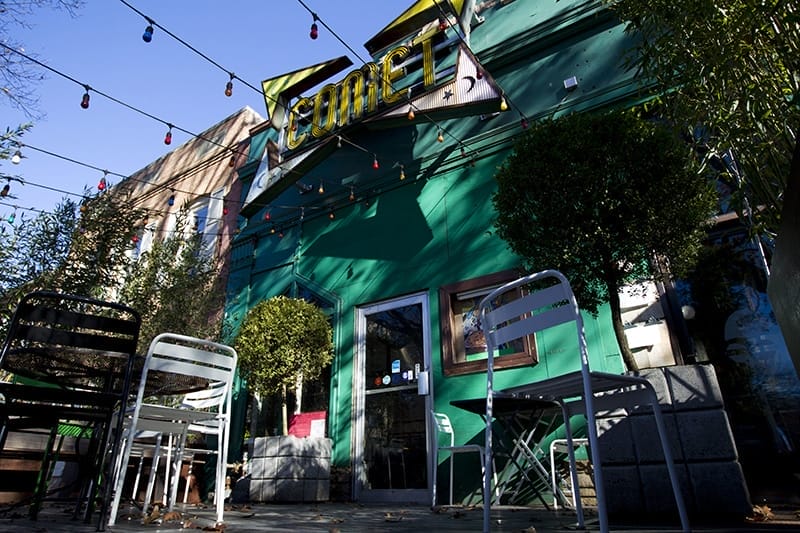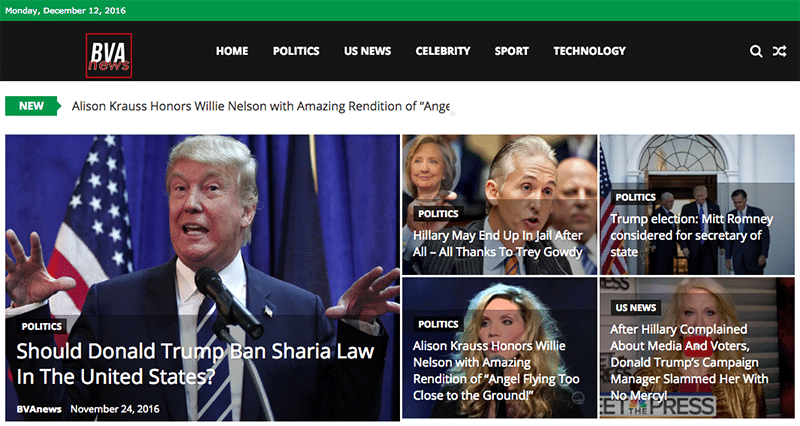Craig Silverman on fake news

The Comet Ping Pong pizza shop in Washington DC was the scene of a bizarre fake news story which alleged that Hillary Clinton ran a child sex ring from the shop. On 4th December, a man walked into the store with an assault rifle claiming he was there to “self investigate”. Photo: Jose Luis Magana/AP/Press Association Images
Fake news is big news. The election of Donald Trump has thrown the large-scale dissemination of hyper-partisan stories – ranging from misleading to completely incorrect – into the limelight. President Obama talked “almost obsessively” about the BuzzFeed story that Macedonian teens were running pro-Trump fake news sites to make some extra cash. Meanwhile, one piece of analysis found that 38 percent of posts on three right-wing Facebook pages contained false or misleading information, while on three left-wing pages it was 19 percent.
Behind both of these scoops was journalist Craig Silverman, who has kept tabs on misinformation and fake news since the early 2000s. We asked him about the recent surge of nonsense spreading online – and what we can do to stop it in its tracks.
You’ve been covering the misinformation and fake news beat for more than a decade now. After all that time, how does it feel to read that the president of the US is talking “almost obsessively” about your work?
It’s really strange. It had never occurred to me that that story would end up being read by the president, let alone have him supposedly be obsessed with it. Obama has a very deep and personal experience with misinformation. There have been birtherism and other falsehoods that have spread about him and his family. My guess is that his personal experience is a factor in why the story resonated with him so much.I was in this weird corner covering this for more than a decade and now all of a sudden it’s one of the big topics of conversation. The flipside to the amount of attention fake news is currently getting is that there’s misinformation about misinformation going around. I’ve seen really bad lists circulated of supposed fake news websites which include a lot of websites that are simply ideologically driven. That doesn’t mean everything they publish is perfect but the mainstream media makes lots of mistakes too. I’m really happy that fake news is now a big topic but I don’t want us to go into the other realm of starting to advocate blacklists and censorship and I’m starting to see that happen. I’m worried that authoritarian regimes in the world will accuse anyone engaging in free expression of spreading ‘fake news’ and shut them down.
Craig Silverman
How has the issue of fake news and misinformation evolved since you started paying attention to it in the early 2000s?
The volume of false news is higher than it has ever been. At the same time the exposure it gets and the amount of people who are believing it seems to be fairly extreme. One reason why this is happening is because of the power of platforms and networks like Facebook and Google. These have done wonderful things in terms of democratising media so that anybody can publish and potentially reach a lot of people. The downside of this is that it applies to both good and bad information. In the three to six months running up to the US election, the amount of traction that completely false stuff was getting on Facebook seemed out of control and out of whack compared to true stuff.
Is the spreading of fake news a symptom or a cause of the rise of populism we’ve been seeing?
Over the past few decades we’ve seen a steady decline in the level of trust that people have in mainstream media institutions. There are a lot of people who genuinely don’t trust big media and who go looking for other places to find their information. It’s easy to find lots of other options now – a whole industry has sprung up to serve that desire and present information in a way that says ‘We’re not the big media, we’re you’. That’s happening for all different kinds of political stripes, but it seems to be most successful on the right. Particularly on Facebook it’s as though the more partisan and extreme you are – and in some cases the less true the information is – the more engagement you’re going to get. I’ve had people who run pages like these admit that the stuff that’s fake and misleading tends to do the best because it’s telling people exactly what they want to hear.The infrastructure for the dissemination of misinformation about certain topics is very powerful. Just last week a rumour that an Imam had called on muslims to boycott Peppa Pig got picked up by a lot of tabloids in different parts of the world. When someone from BuzzFeed news got a hold of this guy he said he had never even heard of the cartoon. It happens all the time that a couple of things get smushed together in an unexpected way and it takes off because there are networks of people who are looking for certain kinds of things that will get their audience excited. There is a very strong network of websites looking for stuff to stoke anger and fear against muslims. I see stuff going viral in that area all the time. These websites watch each other and when one of them gets a story about a refugee or a muslim doing something bad, it’ll get serious traction in five to ten countries within 48 hours.
BVA News is one of the more than 100 pro-Trump sites Silverman found to be run out of a single Macedonian town
Should Facebook be held to the same standards as large media companies?
I do think that Facebook, besides being a platform and technology company, is also a media company. But I wouldn’t say that it should be treated as the New York Times. The New York Times doesn’t have 1.8 billion people publishing on its website at least monthly if not more frequently, so the dynamics are very different. Facebook does have a responsibility for what flows on its platform and it has to figure out a way to strike the right balance between free speech and open networks while making sure that it doesn’t become the world’s biggest distribution network for hate speech, lies and propaganda. No information platform has ever reached the scale that Facebook has – there’s no playbook for how to do this. So the fact that they don’t know how to do it isn’t surprising, but it’s time for them to put more effort into it.What about us news consumers – can we do anything to prevent misinformation and fake news from spreading?
For the average person it’s about having an awareness of how pervasive misinformation is. When you see something on a social network which triggers an emotional response in you, either good or bad, your next response should be to say ‘Hold on’ and take a good look at it: What’s the URL? Have you ever heard of the site before? Does the story cite any credible places and does it link out to them? Those are some steps that would help people avoid the vast majority of fake stuff. The tricky part is that sometimes there is real new information that comes out which in its early moments can sound kind of sketchy and confusing. The best policy when that happens is to wait and see how it plays out before sharing.Are you optimistic or pessimistic about news consumers taking more responsibility for vetting news before they share it?
I’m pessimistic that large general populations will start being a lot more careful about what they’re reading and sharing. I think the best chance for broad change in human behaviour on how they consume the news is to think about ways of integrating elements of media literacy and critical thinking and reading into education systems as a whole. Broad change is really difficult in any other way unless it’s systematically put into education systems.
Slow Journalism in your inbox, plus infographics, offers and more: sign up for the free DG newsletter. Sign me up
Thanks for signing up.







